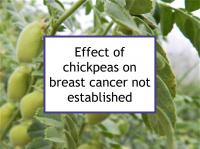Chickpeas (Cicer arietinum), also known as garbanzo beans, are a good source of insoluble fiber, folate, and vitamin B6. Chickpeas also incorporate copper, iron, selenium, and zinc. In addition, chickpeas are a source of isoflavones, including biochanin A and genistein, but at much lower concentrations than soy products.
Studies have shown that eating chickpeas can improve insulin resistance and reduce total cholesterol. However, there is not enough available evidence to determine the effect of consuming chickpeas on breast cancer.
Breast cancer-related effects of eating chickpeas
One study found increased colon tumorigenesis in rats fed a diet containing chickpeas and exposed to a known carcinogen versus a normal diet. Another study found that chickpeas can have both cell growth-promoting and cell growth-inhibiting effects, depending on the type of cell. A 2020 study reported that chickpea isoflavones inhibited (ER+/PR+) breast cancer cell proliferation.
Population studies normally include chickpeas with dry beans and lentils when evaluating dietary effects, so that it is difficult to isolate the effects of consuming chickpeas specifically on breast cancer risk.
Additional comments
Hummus is a spread or dip made primarily from cooked, mashed chickpeas.
Sources of information provided in this webpage
The information above, which is updated continually as new research becomes available, has been developed based solely on the results of academic studies. Clicking on any of the underlined terms will take you to its tag or webpage, which contain more extensive information.
Below are links to 20 recent studies concerning this food and its components. For a more complete list of studies, please click on chickpea.
